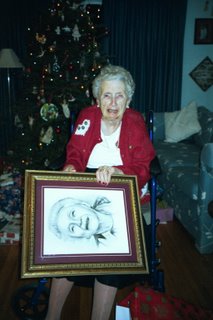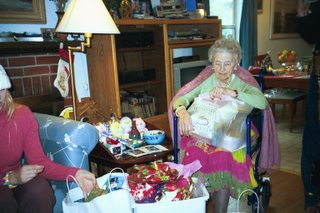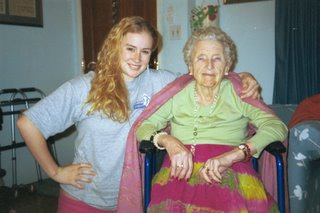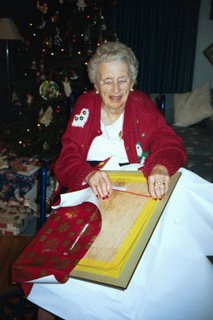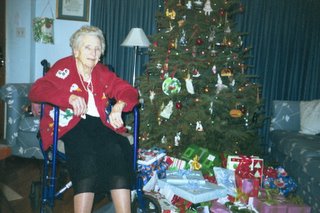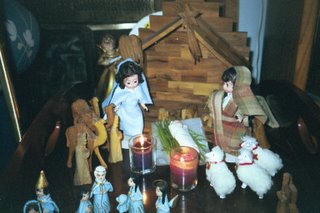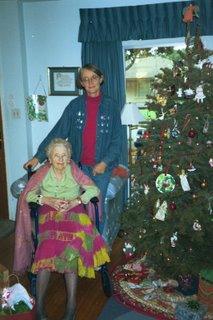My mistake was telling Mom a few days ago that Roz had bought a pair of corduroy pants. I was just updating her with news of her grandchildren away at college, but the image of those pants stayed in her mind.
Scene 1 I arrive on Sunday afternoon, still a bit shaky from the stomach flu, and planning a not-too-strenuous few hours.
Mom, however, has her mind on corduroy pants.
First let me explain that she never used to spend much time or money on shopping. She was a no-nonsense nurse--first psychiatric, then public health and ob/gyn. Then she taught nursing at the University of Maryland for 13 years. After that she was a Red Cross volunteer and a Meals on Wheels driver, along with finally joining the social clubs that had been her own mother's life: PEO and DAR.
Now she can't do any of that. Because of her gradually appearing dementia, she gave up driving, volunteer work, and even the social clubs.
There are three things she can still do, outside of coming to my house to eat a meal and be with the family:
1) go to church,
2) dine at restaurants (if wheel-chair accessible)
3) shop.
Her favorite thing is shopping. Wielding the power of the credit card, she feels important. If she has several shopping bags on her lap, being pushed around in a wheelchair doesn't feel so bad.
"Thank goodness you're here," she says when I arrive at 3 pm. "I need to go find some corduroy pants."
"What? You have lots of pants," I answer. "You don't need to buy any more."
"Roz bought some corduoy pants, and I need some too," she declares.
"Not today," I say, but she begins whimpering.
"You never let me go shopping..."
I'm startled by her launch into high-pitched, barely intelligible entreaties.
"What do you mean I never take you shopping? Two weeks ago you bought that new lavender silk blouse, two pairs of shoes, and a necklace."
"Well, that was two weeks ago." She continues crying, and I marvel at her shameless use of tears for manipulation. "There won't be any corduroy left--someone else will buy them."
After more aruing, I cave. "Okay, we'll go to Macy's," I say.
Then I try humor: "You have such a sad life here, being waited on hand and foot. You only get to go shopping every two weeks."
"It's true!" she insists, laughing.
Scene 2We arrive at the mall, driving up several floors while looking for a handicapped parking place. I don't want to park on top, where the sunshine will be too bright for her. I spot two empty spaces together and quickly take one of them, grateful for the extra space in which to get Mom out of the car, but after I park a shiny gray sportscar slips into the spot next to me.
"Oh no!" I'm thinking, and I dramatically pull the wheelchair out of the back of my van as the driver and his friend get out of their car. But they don't take the hint. They click to lock the car doors and walk off.
Now I face a moral dilemma. Can I get Mom into the wheelchair without scratching the sportscar? Should I get back in my van and look for another spot? What if there are no more large spaces or handicap spaces?
I should have parked in the middle of the two spaces to reserve the extra space I needed to maneuver her out of the car without doing any harm to other cars.
I experiment with opening my car door and resting it ever so gently against the other car. It seems okay. I think I can do this without reparking the van.
Scene 3I am debating whether to take her to Sears or Macy's. How are we going to find corduroy pants in a size that will fit her? She's gone from 5'7" to less than 5'; her waist has expanded, and her back is permanently hunched over by a couple of crushed vertebrae. How can she even try pants on? The only way she can stand up is by holding onto a handicap bar.
I decide to take a brief tour through the petite section of Macy's before heading to Sears.
Mom decides to enlist the help of a saleslady and starts shrieking,"Corduroy pants! Corduroy pants."
Soon a kind woman is helping us search, and the miracle happens: she finds some soft dark brown pants that don't look corduroy to me but indeed have a fine thin ribbed pattern.
"Actually the pants need to have an elastic waist," I explain, looking at some velveteen pants that have just such a waist. When I shop for Mom, I buy "Petite Large" with an expandable waistline (translate: short fat). No trying on needed.
Today we will try to try on, I decide. I pile both pants onto Mom's lap, but she has noticed a white sweater with a collar of lush tan rabbit's fur.
"This is what I was looking for," she exults, and I remember her remark a few days ago about wanting a coat with a fur collar. I let her add the sweater to the stack of clothes in her lap. She continues to see silky blouses and other things she wants to buy. I'm checking price tags and trying to figure out how to leave the store with as few items as possible.
Scene 4We are in a large, handicapped-accessible fitting room, thanks to the kind attendant. There's plenty of room for the wheelchair, and there's even a white bar to hold onto. I'm committed to taking Mom's shoes and skirt off to slip on the pairs of pants, and I think I can get her standing briefly to try the pants on.
There's just one problem: a bad smell that makes me think she may have had a BM in her Depend. I forgot to bring any extras with me, so I can't take her to the restroom.
The thought occurs to me: "Does 'you break it, you buy it' apply to soiling clothes while trying them on?"
Scene 5We are at the cash register, about to buy the corduroy pants and the rabbit fur sweater for a total of about $150 before tax.
"Where's my purse?" Mom asks. "Just use my credit card."
"Okay," I say.
The elaborate deception begins.
I hand her the soft pink leather purse and she begins trying to get her wallet out. Meanwhile, I hand the cashier her debit card, which I keep in my wallet. It has my name on it, but it is for her bank account.
"Here, Mom, let me get your wallet out," I say. I take the wallet and hold it, pretending to remove a credit card. Later I return the wallet to the purse in her lap.
I punch in the PIN code and return the card to my wallet.
That's how we handle things financially. My sister and I keep Mom's debit and credit cards; I write her checks. There's actually nothing of any importance in her wallet, except a little cash. She continues to believe that she needs her wallet and purse to go shopping, and we don't tell her otherwise.
Scene 6We wheel back to the car. I'm tired and getting ever more queasy but grateful that we don't have to go to Sears.
I open the car door and--tap--it hits the sportscar still sitting next to me, not very hard but hard enough to flake off a tiny bit of paint, one square millimeter, from the rim near the wheel.
I panic and read the name of the car: Boxster XP or something like that.
"Maybe it's just a snazzy Toyota," I say to myself, walking around to the front to see if there's any other name on it.
"Porsche."
Return of the moral dilemma: should I leave a note, offering to pay for the damage? As I begin writing various versions in my head, it quickly becomes apparent that anything I say will be ludicrous.
"Battered van owner to Porsche owner: I'm sorry I didn't keep looking for a wheelchair-accessible parking space today. Feel free to contact me (but only if this is your first ding) and let me know your cost to--"
Scene 7Mom is back at Ocean View, fingering the rabbit fur around her new sweater. "It's so soft and warm," she says with satisfaction.
I'm sewing the extra button that came with the pants onto the waistband to make it as large as possible.
"You got your shopping trip," I say. "We found the corduroy pants."
I hang them up in her closet next to her nine pairs of elastic-waist pants. No, she didn't need these purchases, but she spends her days locked in the Reminiscence Neighborhood.
These pleasures are all she has left.
